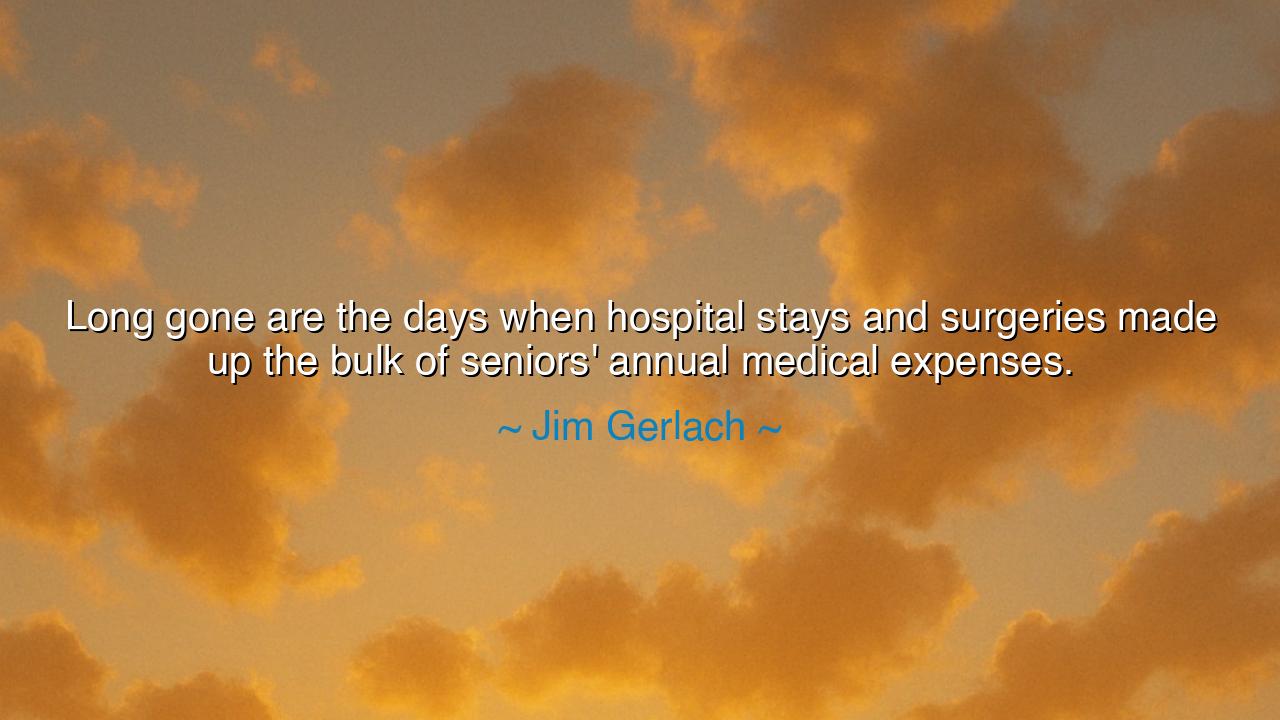
Long gone are the days when hospital stays and surgeries made up
Long gone are the days when hospital stays and surgeries made up the bulk of seniors' annual medical expenses.






In the words of Jim Gerlach, there sounds the measured wisdom of observation and change: “Long gone are the days when hospital stays and surgeries made up the bulk of seniors’ annual medical expenses.” Though these words may appear practical and modern, they carry within them a profound reflection on the transformation of human care and the aging journey. Beneath their surface lies a story of shifting worlds — from an era of emergency and crisis to one of continuity and management, from a time when healing was sudden and dramatic to a time when it is steady, deliberate, and lifelong.
The meaning of this quote reaches beyond the boundaries of medicine; it speaks to the evolution of life itself. Once, the illnesses of age struck like storms — heart attacks, fractures, infections — great battles fought within the walls of hospitals, with surgeons and machines standing as warriors against the inevitable decline of time. Now, however, the struggle has changed form. The enemies of old age are not only sudden but slow: chronic disease, long-term care, and the quiet wear of the years. The art of medicine has transformed from the dramatic rescue to the steady guardianship of life. Gerlach’s words remind us that humanity has entered an age where survival is no longer the triumph of a single moment, but the ongoing practice of balance, prevention, and stewardship.
The origin of this statement lies in the political and social discourse of modern healthcare, particularly in the United States, where Gerlach — a public servant and advocate for health policy — spoke of the challenges faced by the elderly. He recognized that as technology advanced and lifespans lengthened, the burdens of aging changed shape. No longer was the primary concern the sudden cost of hospital care, but the slow accumulation of medications, therapies, and long-term support needed to sustain life in dignity. His observation was both a warning and a call to wisdom — for in this new world of longevity, the question was no longer how to cure, but how to care.
This transformation mirrors the cycles of human civilization itself. In the ancient world, the healer was often the warrior — the one who fought death with herbs and prayers, with blood and bravery. But as the centuries passed, healing became an art of continuity, of tending the flame rather than rekindling it. Consider the story of Hippocrates, the father of medicine, who once declared that the physician must “do no harm” and seek not merely to cut away disease, but to understand its roots in the whole of life. He understood that health was not the absence of illness but the harmony of body, mind, and environment. Gerlach’s reflection carries that same lineage — it speaks of a world where the healer’s work is no longer crisis alone, but maintenance, compassion, and foresight.
In this new age of medicine, however, there is both triumph and burden. Long life is a blessing, but it comes with new trials. The elder who once survived the heart attack may now live many more years but must manage the unending companionship of medicine, therapy, and expense. Families who once gathered at the hospital now gather around the kitchen table, organizing pills and schedules. Gerlach’s words, though practical, carry an undertone of concern — that society must adapt its systems of compassion to match its miracles of science. The challenge of the future is not merely to extend life, but to ensure that the years we gain are years of purpose and comfort, not isolation and cost.
Yet within this change lies a lesson of balance. Progress, though powerful, demands mindfulness. As our knowledge expands, so too must our understanding of what it means to live well. The ancients taught that health was a matter of alignment — of diet, rest, thought, and spirit. In the same way, modern people must learn to weave medical science with the wisdom of self-care: to move, to nourish, to connect, to find meaning beyond the medicine. For no technology, however advanced, can replace the quiet healing that comes from human dignity, love, and community. Gerlach’s statement, though rooted in policy, calls us to personal responsibility and collective compassion.
And so, the teaching we may take from his words is this: care has become a lifelong art, and each of us is both patient and healer. The hospital is no longer the center of medicine — the home, the heart, and the habits of daily living now hold that sacred place. Let us honor the elders not by counting their pills, but by surrounding them with purpose and connection. Let us remember that the goal of life is not merely to survive longer, but to live wiser. For though “the days of hospital stays” may be long gone, the deeper work of healing — the work of soul, compassion, and balance — remains eternal.
Thus, let these words of Jim Gerlach be remembered not as a lament of modern cost, but as a reflection of humanity’s growth. We have conquered the terrors of sudden illness; now we must conquer the quiet suffering of neglect. Medicine has extended our days — it is up to wisdom, love, and society to make those days worth living.






AAdministratorAdministrator
Welcome, honored guests. Please leave a comment, we will respond soon